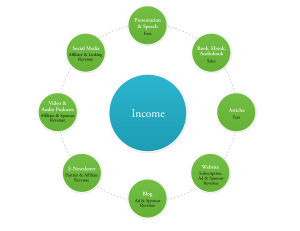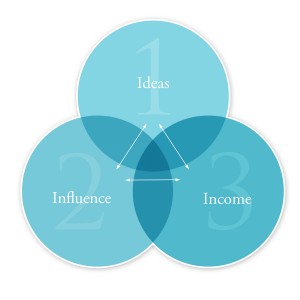 Got Platform? Part 3 of a Three-part Series: Income
Got Platform? Part 3 of a Three-part Series: Income
Greenleaf Book Group is a publisher and distributor that specializes in the development of independent authors and the growth of small presses. Our publishing model was designed to support the independent author and to make it possible for writers to retain the rights to their work and still compete with the major publishing houses. Carly Willsie is an Assistant Consultant at Greenleaf where she handles the acquisitions process. In her current role, Carly reviews submissions for market viability and superior content, and works to identify books that will be great additions to Greenleaf’s respected line of titles. She also manages the Big Bad Book Blog and internal social media efforts.
The term “platform” is ubiquitous these days. We see it in the business world, hear it bandied about among authors, experts, and speakers, and we experience it in the social media landscape. This phenomenon isn’t accidental. Platform is a powerful concept that reflects the content, brand, positioning, credibility, audience, and intellectual property you develop. Your platform lives at the intersection of ideas, influence, and income—and your book’s success depends on it.
In this three-part series, we’ll share valuable information and resources to help you create, maintain and boost your platform. To learn more about Greenleaf Book Group’s platform development program, visit greenleafbookgroup.com/platformdevelopment.
Income. It’s the last piece in the platform development puzzle and the final brick on your path to success. It’s an absolutely essential function of your business and brand. It’s where your audience shows you the money, and it’s where all your idea-generating and influence-building pays off—literally.
Income is the ultimate product of great ideas, great content, and strong influence in the form of interaction and conversation among your audience. Income means monetizing your ideas and converting customers into closed leads. Great ideas combined with a powerful interaction strategy can lead to great business if handled correctly, as Bethenny Frankel of The Real Housewives of New York City fame has showed us over the past few years.
We usually think of The Real Housewives cast members as, well, housewives. And with a few exceptions, that’s mostly what they are—women who have the financial luxury to spend most of their days throwing catered dinner parties and gossiping with pricey cocktails in hand. Not many reality TV stars have made the leap from “personality” to true entrepreneur, but Frankel was able to use the show to build and promote her now-infamous Skinnygirl brand.
When Frankel first appeared on the show, she was the relatively “broke” housewife, a natural foods chef living in a 700 square-foot closet of an apartment and struggling to make rent. But she had an idea—a low-calorie margarita—and she used the exposure she received from the show to cultivate her influence and create a strong brand. Two years later, and she’s sold her Skinnygirl cocktail line to Beam Global for a price rumored to be around $120 million—an unheard-of number in the spirits marketplace for a single celebrity. Even though reality TV is often seen as a joke, Frankel is dead serious in her income-building. And now uber-rich.
You, too, can make income happen when you’ve built enough influence and interaction around your content and found your audience’s pain points, or points of interest. Check out our suggestions below to seamlessly and successfully make income a part of your platform-building experience.
1. Diversify your offerings.
You’re going to want a diversified set of product offerings, or assets, to generate multiple streams of income—content, products, services, and programs. You can customize these for audience segments and areas of expertise. Below are a few specific examples of great income-generators:
- Speaking and presenting—keynotes, breakouts, or workshops
- Book sales
- Training sessions and facilitation
- Affiliate marketing
- Custom downloads from your website

Don’t be a one-hit wonder when it comes to generating salable content. Be dynamic. Not only does Frankel continue to market and support her claim to fame—her Skinnygirl margarita—she also offers health DVDs, several bestselling books, online personal training, shapewear, and dieting and cleansing products. All of this is, of course, in addition to her countless paid media and event appearances.
2. Keep an open mind.
A successful income strategy also means building partnerships and welcoming the right sponsorships, spokesperson opportunities, affiliate marketing, and anything else you can think of. Don’t be afraid to dive into new territory.
When Frankel was first approached by Bravo to join The Real Housewives cast, she refused for two months. However, she considered the influence-building potential of the show, and cites business exposure as the only reason she finally said yes, according to the Hollywood Reporter . Keeping an open mind not only allowed Frankel to launch her Skinnygirl line; it also earned her a spin-off show, Bethenny Ever After, which garners over a million viewers per episode.
3. Facilitate the process.
Make sure that your content is easily found and easily bought. Invest in a user-friendly and well-designed website to help facilitate and automate ecommerce. Don’t settle for a second-rate one, either—your online presence is going to be where your audience turns to learn about you, buy from you, and stay engaged with you.
Remember that income is ultimately about selling more of less. It’s about the long tail. Sometimes it’s best to start by giving away valuable content. You’ll build trust and get people engaged. They’ll want more.
4. Repurpose.
Ideas are valuable. Keep a list of your ideas for income-generating content and revisit it often. Just because someone might not be willing to pay for your product now doesn’t mean you’ll never be able to sell it. As your influence grows, you’ll be able to leverage more of your ideas into income-making opportunities.
A list is also a good idea because it will help you figure out ways to divide and repurpose your content assets. For example, you could turn your book or blog into a workbook or webinar series. Keep in mind that services and programs like speaking, training, and coaching have a higher perceived value and require higher pricing. You should focus on breaking into these worlds if you haven’t already.
Frankel was able to negotiate the astronomical purchase price of Skinnygirl because of her unique idea and powerful influence. Still, it took some time and some great opportunities for her to get there. The lesson for anyone who aspires to grow is that building a platform happens one “I” at a time—with ideas, interaction, and income. The more time you spend on each component, the better your platform will be and the stronger your income-generating opportunity.
The other idea to keep in mind is that in the end, you will be as successful as the quality of your platform. And the quality of your platform will determine your opportunities and income over time. As you focus on building your platform, think about Gary Vaynerchuk, Suze Orman, Bethenny Frankel, and other creative entrepreneurs that have transformed great ideas into influence and income. Each has mastered the three “I’s” and this mastery has resulted in a powerful platform.
For more information on the ins and outs of what a platform is and how to get started on developing one, check out parts 1 and 2 of Greenleaf’s platform development series, in which we discuss the necessities of great ideas and strategic influence. Want help expanding your influence and developing your expertise? Greenleaf offers a broad range of platform development services, including integrated brand strategy; keynote and presentation design; print and online product development; speaker reel and video production; social media strategy; and more. For a full list of what Greenleaf can do for you, visit www.greenleafbookgroup.com/platformdevelopment.





